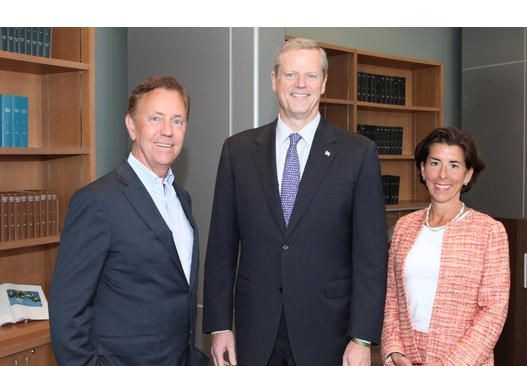latest
MA, RI, CT commit to reduce vehicle pollution, but at a possible cost of over 24 cents more per gallon of gas

BOSTON — Last week, Massachusetts Governor Charlie Baker, Connecticut Governor Ned Lamont, Rhode Island Governor Gina Raimondo and Washington, D.C. Mayor Muriel Bowser signed a Memorandum of Understanding (MOU) committing to a groundbreaking multi-state program that will reduce motor vehicle pollution by at least 26 percent and generate over $1.8 billion in Massachusetts by 2032. The bipartisan Transportation and Climate Initiative Program (TCI-P) will allow participating jurisdictions to invest in equitable, cleaner transportation options, and create significant new employment opportunities while substantially improving public health across the Commonwealth and New England.
Underscoring the importance of regional action, other Transportation and Climate Initiative (TCI) jurisdictions released a joint statement committing to continued collaboration on the development of the regional program, as well as working to identify additional regional strategies to reduce air pollution, create healthier communities, and invest in cleaner, more equitable transportation systems. Significantly, the State of North Carolina joined the joint statement, committing for the first time to working with the other TCI jurisdictions on the development of the program. With the issuance of the MOU, the remaining TCI jurisdictions have the ability to formally sign the MOU at any time. The program is slated to begin in 2023 after a reporting year to allow for additional jurisdictions to sign on.
“As a Commonwealth, we have an obligation to address climate change head on and a challenge this great requires action across our region and nation. That’s why I am proud to join Governor Lamont, Governor Raimondo and Mayor Bowser to launch this trailblazing program to reduce greenhouse gas emissions while building the clean, resilient transportation system of the future,” said Governor Charlie Baker. “By partnering with our neighbor states with which we share tightly connected economies and transportation systems, we can make a more significant impact on climate change while creating jobs and growing the economy as a result. A dozen Transportation and Climate Initiative states are also committing to this effort today and we look forward to these partners moving ahead with us as we build out this first in the nation program.”
In a region with nation-leading climate goals, Massachusetts, Connecticut, Rhode Island and Washington, D.C. are committing to bold action to ensure the achievement of emissions reduction targets while positioning the jurisdictions and region as leaders in the clean transportation economy. Accounting for 73 percent of the transportation emissions, 76 percent of the vehicles, and 75 to 80 percent of the gross domestic product in New England, the three states and Washington D.C. are taking this action at a time when the impacts of climate change continue to be felt across the country and region.
“Engaging in this way with my fellow governors and Mayor Bowser accomplishes goals we have set for Connecticut for years,” said Connecticut Governor Ned Lamont.“Participating in the TCI-P will help grow our economy through a fresh injection of capital to provide for jobs and new infrastructure. This collaboration will cut our greenhouse gas emissions, and it will make our urban centers healthier, after decades of being adversely impacted by the emissions being released by traffic every day. Connecticut has always taken pride in our leadership role when it comes to climate, and when we can combine that with a stronger economy, fast transit systems, and regional cooperation, that’s a win for all of us.”
“Joining the Transportation and Climate Initiative is an investment in Rhode Islanders,” said Rhode Island Governor Gina M. Raimondo. “This first-of-its-kind program will provide $20 million annually for public transit, safe streets for bikers and pedestrians, and other green projects. Most importantly, it will provide much-needed relief for the urban communities who suffer lifelong health problems as a result of dirty air. I look forward to working with the Rhode Island General Assembly to launch this program and protect the health of Rhode Islanders.”
“My vision is for the District to be the healthiest, greenest, most livable city for all our residents,” said Washington, D.C. Mayor Muriel Bowser. “To realize that vision, we have ambitious goals – for mobility, equity, and climate – and this program is an opportunity to accelerate all three, together. That’s why I’m proud to join this collaboration, leveraging a multi-jurisdictional commitment to cutting pollution to deliver real health benefits and investment dollars for all eight Wards.”
In New England, transportation is responsible for over 40 percent of greenhouse gas emissions, and exposure to air pollution exacerbates lung and heart ailments, causes asthma attacks, and increases the risk of a stroke and other serious health conditions. To address these challenges, the new program will make available over $160 million in allowance auction proceeds to Massachusetts by 2023 — money to provide better transportation options that result in less pollution, improved health, and a growing economy.
“The COVID-19 pandemic has highlighted the need to proactively invest in protecting public health, especially in communities most affected by air pollution,” said Lt. Governor Karyn Polito. “The Transportation and Climate Initiative Program provides a critical opportunity to improve air quality throughout the Commonwealth, create jobs for Massachusetts residents, and help our state and regional economies recover.”
“The next decade is pivotal for all levels of government to take deliberate action to avoid the worst impacts of climate change, and this historic multi-jurisdictional program will unlock solutions that reduce emissions and protect our most vulnerable residents in environmental justice communities and communities underserved by transportation options,” said Energy and Environmental Affairs Secretary Kathleen Theoharides. “Importantly, all TCI jurisdictions have committed to continuing their work together on the program, and we look forward to welcoming additional states into the program while continuing our work across the region to meet our Net Zero climate goals here in Massachusetts, improving local air quality, and deploying new, clean transportation options.”
The TCI-P jurisdictions have committed to invest 35 percent of annual revenue in communities underserved by current transportation options, and with disproportionately high levels of pollution. To ensure equitable clean transportation outcomes, Massachusetts will designate an advisory body with diverse representation to identify underserved and overburdened communities, provide guidance for investments, and define goals and metrics for measuring progress.
“Tackling a challenge as big as climate change requires regions to work together and both the Memorandum of Understanding and joint statement represent a commitment by a broad group of states to continue collaborating on strategies that can bend the curve on transportation greenhouse gas emissions, which continue to be the largest and fastest growing source of climate-altering pollution,” said Transportation Secretary and CEO Stephanie Pollack.
“We look forward to ongoing engagement with communities, especially those that have been overburdened or underserved,” said Massachusetts Department of Environmental Protection Commissioner Martin Suuberg. “MassDEP will work to engage with those communities and all interested parties as we move forward.”
“TCI utilizes a proven mechanism to protect our environment, stimulate our economy, and improve public health. This agreement demonstrates that climate change need not be a partisan issue nor a point of contention between the business and environmental communities,” said Elizabeth Turnbull Henry, President of the Environmental League of Massachusetts. “COVID-19 has highlighted the serious health consequences of pollution and poor air quality. We applaud Governor Baker for his early and effective leadership in making TCI a reality.”
TCI-P will require large gasoline and diesel fuel suppliers to purchase “allowances” for the pollution caused by the combustion of fuels they sell in the regions. The total number of emission allowances would decline each year, resulting in less transportation pollution. Each participating jurisdiction will independently decide how to invest program proceeds. These proceeds will be invested in ways that help both urban and rural residents, including improving and expanding public transportation; zero-emission buses, cars, and trucks; electric vehicle charging infrastructure; development of interstate electric vehicle charging corridors; improving high speed wireless internet in rural and low-income areas to allow for teleworking; repairing existing roads and bridges; and providing safer bike lanes and sidewalks.
The TCI-P is expected to help with air pollution, but at a cost.
According to a study by Tufts University, TCI will almost certainly result in higher gas prices. In their moderate-growth scenario, a 22 percent reduction in emissions would generate a 24-cent-per-gallon increase in gas prices in 2022. With the program aiming to reduce emissions by at least 26 percent, the gas price increase could be even greater.
-

 Community6 years ago
Community6 years agoNational Shrine of La Salette Festival of Lights 2017 set to begin
-

 Community6 years ago
Community6 years agoMassachusetts State Police looking for good home for retired dogs
-

 Crime6 years ago
Crime6 years agoFall River ranked most dangerous city in Massachusetts according to report
-

 latest6 years ago
latest6 years agoDurfee student allegedly overdoses on marijuana
-

 Community6 years ago
Community6 years agoVideo of Fall River Police goes viral
-

 Causes6 years ago
Causes6 years agoMissing Fall River woman found deceased
-

 Crime6 years ago
Crime6 years agoFall River Police add names to most wanted list
-

 Causes6 years ago
Causes6 years agoFall River teenager reported missing has been found






Liberty
December 28, 2020 at 2:01 pm
Dirty thieves! Economy is in failure for most of us but the thirst for more of the fruits of our labor are unquenchable! ROT IN HELL!
Rosco17
December 29, 2020 at 1:34 pm
OUTRAGEOUS! They state “improving local air quality, and deploying new, clean transportation options.” Tell me, exactly how? All of us will still be using our vehicles. How does that improve air quality? More businesses are closing every day with all the COVID-19 restrictions the Governors are implementing and their announcing they want “money to provide better transportation options that result in less pollution, improved health, and a growing economy.” On my dime? Why don’t they balance their budgets to implement this “Transportation and Climate Initiative”? Do you know why? It because they want to create “an advisory body with diverse representation to identify underserved and overburdened communities” They have many cronies they need to grease the palms of and you can’t budget for something like that. Just with that last quote alone, I wish they just got up there and stated we have to overcome “SYSTEMIC POLUTIONISM”.
Besides isn’t money laundering illegal?